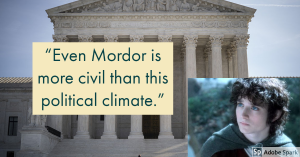With the 2020 elections coming up and the high chance of a lot of controversy amid what will likely be a close presidential race between two geriatric candidates showing signs of cognitive decline, delusions of power, or both, CNN reports in breaking news the Supreme Court has ruled that states can punish electors who refuse to vote for the candidate which has received the popular vote for their particular state.
The Supreme Court said Monday that states can punish members of the Electoral College who break a pledge to vote for a state’s popular vote winner in presidential elections.
The case comes as the election season is heating up, putting the Electoral College will once again be front and center in an increasingly polarized and volatile political atmosphere.
In 2016, 10 of the 538 presidential electors went rogue, attempting to vote for someone other than their pledged candidate. In all, 32 states and the District of Columbia have laws that are meant to discourage faithless electors. But until 2016, no state had ever actually punished or removed an elector because of his or her vote.
The vote count was 9-0.
“Today, we consider whether a State may also penalize an elector for breaking his pledge and voting for someone other than the presidential candidate who won his State’s popular vote. We hold that a State may do so,” Justice Elena Kagan wrote.
“The Constitution’s text and the Nation’s history both support allowing a State to enforce an elector’s pledge to support his party’s nominee — and the state voters’ choice — for President,” she added.
The ruling was “not surprising,” said Steve Vladeck, CNN Supreme Court analyst and professor at the University of Texas School of Law.
“Given the potential implications of a holding that electors could vote for anyone they chose, it’s not surprising that the justices held that states can prevent them from doing so,” Vladeck said.“The only surprise is the unanimous vote in cases at least some expected to divide the Court,” Vladeck added. “Here, at least, concern over the consequences of a contrary ruling appears to have united the Justices.”
Three presidential electors in Washington state, for example, voted for Colin Powell in 2016 rather than Hillary Clinton and one voted for anti-Keystone XL pipeline protester Faith Spotted Eagle. A $1,000 fine was upheld by the state Supreme Court.
In Colorado, the legal outcome was different when Micheal Baca sought to vote for John Kasich instead of Clinton.
Baca’s vote was rejected and he was removed and replaced with a substitute who voted for Clinton. Baca was referred for potential perjury prosecution, although no charges were filed. He filed suit, and ultimately won when the 10th US Circuit Court of Appeals held that while the state does have the power to appoint electors, that does not extend to the power to remove them.
During oral arguments, Frodo Baggins, a hobbit from the “Lord of the Rings” trilogy, became a part of the court’s historical record.
In a line of hypothetical questioning, Justice Clarence Thomas used Baggins as a case study.
“The elector who had promised to vote for the winning candidate could suddenly say, ‘You know, I’m going to vote for Frodo Baggins. I really like Frodo Baggins.’ And you’re saying, under your system, you can’t do anything about that,” Thomas asked Baca’s attorney, Jason Harrow.
“Your honor, I think there is something to be done, because that would be a vote for a non-person. No matter how big a fan many people are of Frodo Baggins,” Harrow said. (source)
To use Justice Thomas’ example, given the insanity that the 2020 election as been, it would be too perfect if a number of electors, instead of voting for Biden or Trump, instead registered a protest by indeed voting for Frodo Baggins.
It is 2020, so why not?



